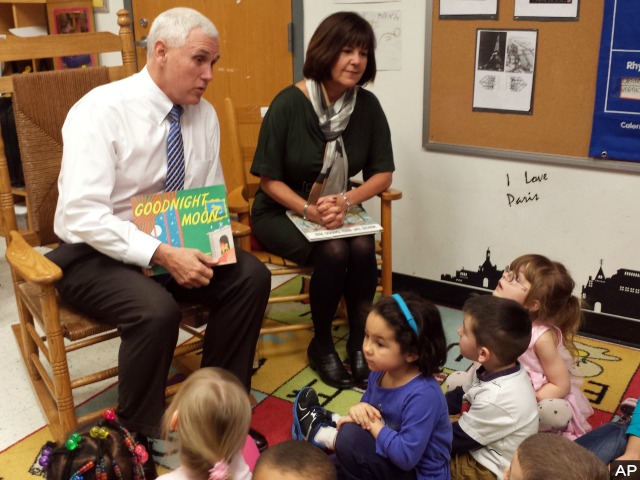Though Indiana withdrew from its multi-state Common Core testing group a year ago, the Partnership for Assessment of Readiness for College and Careers (PARCC) is still listing the state as a member, a fact that adds to the perception of Hoosiers against Common Core parent organizer, Erin Tuttle, that “czars” are actually controlling Indiana’s education policy.
Tuttle’s group had been fighting to have the Common Core standards repealed in the Hoosier state for several years. The grassroots organization has challenged Gov. Mike Pence (R), who claims to be the first governor in the nation to have done away with the controversial standards. Instead, however, after the state legislature passed laws requiring the Indiana Department of Education (IDOE) and the State Board of Education (SBOE) to adopt new standards, the SBOE voted to adopt standards that are remarkably similar to the Common Core and, according to some of the same experts Pence invited to participate in the development of the “new” standards, even inferior to the nationalized standards.
Nevertheless, in a recent piece in the The Wall Street Journal, Pence, considered to be a 2016 presidential hopeful, “rejects” the claim that Indiana’s new standards are indistinguishable from the Common Core.
Tuttle asserts the citizens of Indiana and their elected representatives are being dismissed by a group of education “czars.”
“As critics of the ‘new’ standards have stated all along, there was never an honest attempt to create new standards that would exceed Common Core as the people and legislature directed,” Tuttle wrote in a blog post.
She argues that Pence and state Superintendent Glenda Ritz manipulated around legislation that ended the state’s participation in PARCC.
“It’s true that Governor Pence and Superintendent Ritz both sent letters to PARCC, but neither letter specifically states that Indiana would dissolve its membership with the consortium,” Tuttle writes. “The letter from Governor Pence only stated his “intent to withdraw Indiana as a member of PARCC’s Governing Board,” not from the consortium.”
“Superintendent Ritz’s letter stated that Indiana wouldn’t be participating in the 2014 PARCC field tests–that’s it,” Tuttle adds. “She made no mention of Indiana’s desire to dissolve its membership.”
Tuttle observes that state law is clear that Indiana is prohibited from entering into an agreement with an entity that requires the state to surrender its autonomy or control of education standards and tests.
She notes that a staff member of Theresa Lubbers, Indiana’s appointed commissioner of Higher Education, has also stated that Indiana is still listed as a PARCC member because the state did not direct the consortium to do otherwise.
“Those who control education decisions in Indiana are putting on a façade,” says Tuttle. “Pretending to [be] servants of the people, while furtively doing what they deem necessary.”
“Could it be a coincidence that both Governor Pence and Superintendent Ritz randomly choose to use the words “the PARCC Governing Board” in their letters, instead of the PARCC consortium?” Tuttle responded in an email to Breitbart News. “Possibly, but it’s naive to think either party understands resigning from a committee to mean the same thing as withdrawing from the consortium.”
In addition to the PARCC membership, Indiana’s education policy status is affected by the fact that it received a waiver from No Child Left Behind (NCLB) restrictions when it initially signed onto the Common Core standards. When the “replacement” standards were adopted earlier this year, Pence sent a letter to the Indiana state Board of Education requesting it assist the state’s Department of Education in its endeavor to preserve Indiana’s NCLB waiver.
The state, however, drew the scrutiny of the U.S. Department of Education (USED), which released its Part B Monitoring Report of Indiana’s Waiver for Elementary and Secondary Education Act (ESEA) Flexibility. In response, Lubbers acknowledged that “Indiana ‘always aimed’ to maintain its commitment it originally made in the waiver, which was to adopt the Common Core standards,” Tuttle writes.
Consequently, she asserts the conflict in Indiana among education officials is not over education policy.
“Involved parties agree that Indiana’s course will be set by the requirements to maintain the NCLB waiver–not the people of Indiana,” she concludes. “The conflict, unfortunately, is over how this will be achieved and which czar will be in charge.”

COMMENTS
Please let us know if you're having issues with commenting.